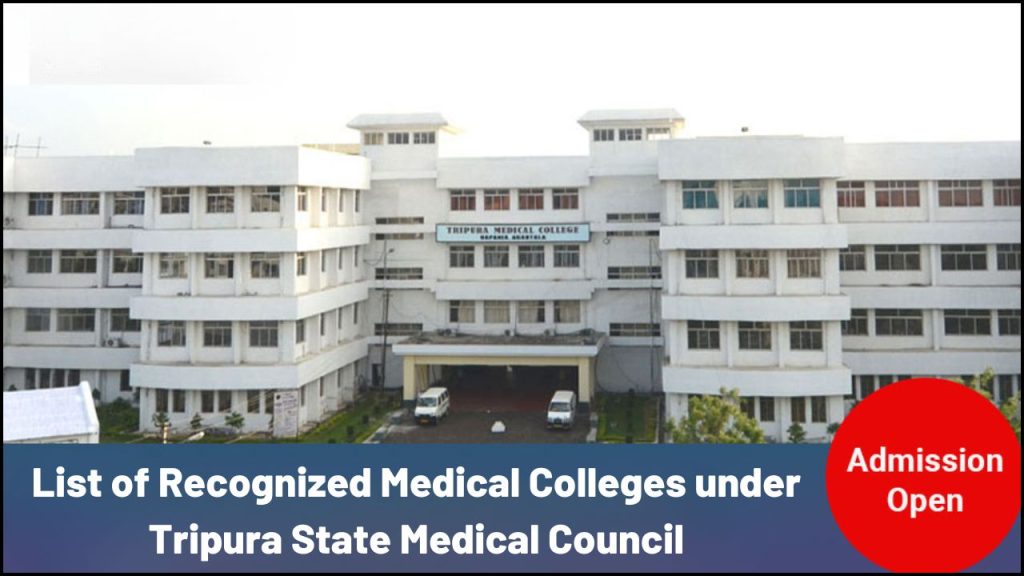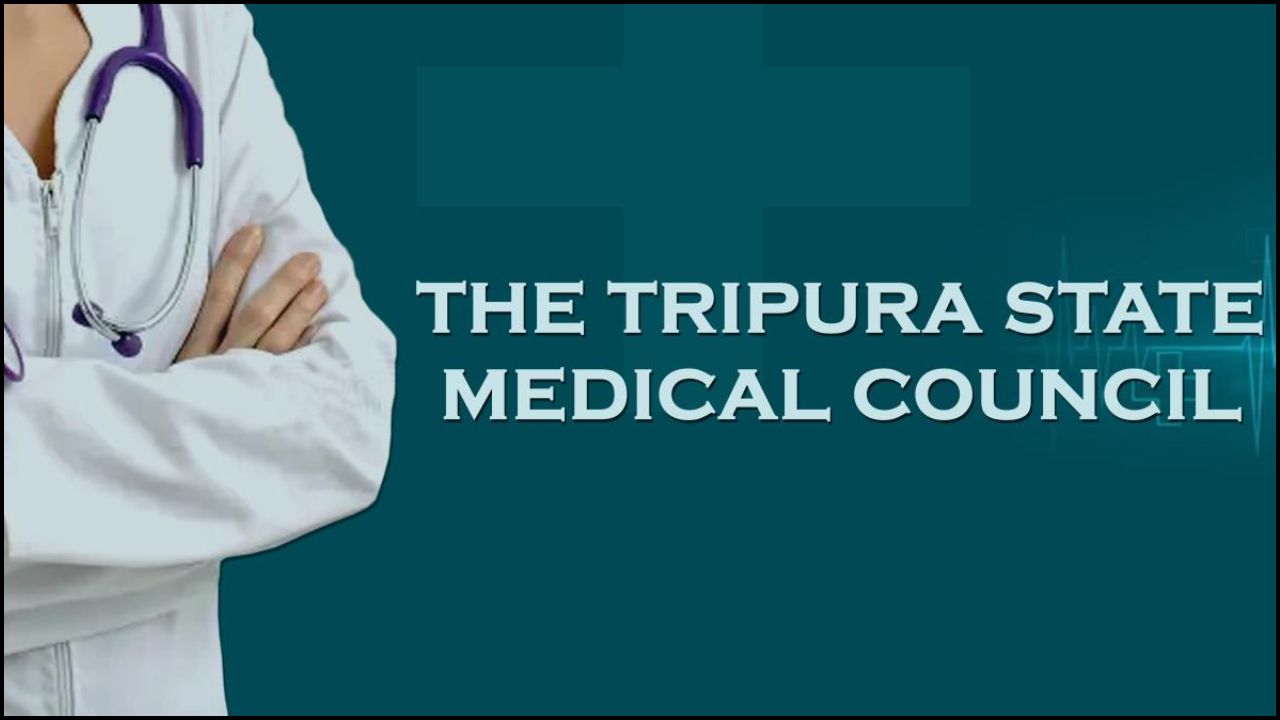
The Tripura State Medical Council plays an important role in regulating medical education and practice in the state. The council is responsible for recognizing medical institutions that maintain the required educational standards. Medical colleges under this council must be approved by both the Medical Council of India (MCI) or National Medical Commission (NMC) and the Tripura State Medical Council (TSMC). The colleges listed below have been officially recognized and permitted to offer medical education and clinical training within Tripura.
Table of Contents
Recognized Medical Colleges in Tripura
The state of Tripura has a limited but focused list of medical colleges recognized by the council. These institutions are known for their quality education, well-equipped facilities, and adherence to medical norms and regulations.
1. Agartala Government Medical College (AGMC)
- Location: Agartala, West Tripura
- Year of Establishment: 2005
- Affiliated University: Tripura University
- Recognized by: NMC, Tripura State Medical Council
- Courses Offered:
- MBBS
- MD (various specializations)
- MS programs
- Annual Intake: 125 MBBS students
- Hospital Attachment: GB Pant Hospital
Key Features:
- Modern library with digital access
- Simulation lab for clinical training
- Research units for faculty and students
- Public health outreach programs
2. Tripura Medical College and Dr. B.R. Ambedkar Memorial Teaching Hospital (TMC & Dr. BRAM Teaching Hospital)
- Location: Hapania, Agartala
- Year of Establishment: 2006
- Affiliated University: Tripura University
- Recognized by: NMC, Tripura State Medical Council
- Courses Offered:
- MBBS
- Postgraduate medical courses
- Annual Intake: 100 MBBS students
- Hospital Capacity: 600+ beds
Key Features:
- Multi-specialty hospital on campus
- Hostel facilities for boys and girls
- Focus on rural health services
- In-house diagnostic laboratories
Details: Recognized Medical Colleges
| S.No. | Name of the College | Location | Year Established | Courses Offered | Annual MBBS Intake |
|---|---|---|---|---|---|
| 1 | Agartala Government Medical College (AGMC) | Agartala | 2005 | MBBS, MD, MS | 125 |
| 2 | Tripura Medical College & Dr. B.R. Ambedkar Memorial Teaching Hospital (TMC & BRAMTH) | Hapania, Agartala | 2006 | MBBS, Postgraduate Courses | 100 |
Recognition Process by Tripura State Medical Council
The Tripura State Medical Council follows a detailed and structured process to recognize a medical college. Institutions are only approved if they meet strict standards related to faculty qualifications, infrastructure, hospital facilities, and academic performance.
Steps in Recognition:
- Submission of the application by the medical institution
- Physical inspection by a council-appointed committee
- Review of teaching staff, laboratories, and hospitals
- Final approval from the National Medical Commission (NMC)
- Issuance of recognition certificate by the State Medical Council
Eligibility Criteria for Colleges Seeking Recognition
Only those medical colleges that meet specific eligibility standards can be recognized by the council.
Eligibility Criteria:
- Minimum 100 MBBS seats with sufficient faculty
- Own teaching hospital with emergency services
- Clinical training facilities in core medical branches
- Approval from NMC and affiliation to a recognized university
- Separate laboratories and lecture halls for each department
Facilities Offered by Recognized Colleges
Recognized colleges in Tripura are equipped with modern educational and healthcare tools. These institutions play a dual role — providing medical education and serving as healthcare providers to the general public.
Common Facilities:
- Teaching hospitals with inpatient and outpatient departments
- Medical laboratories for biochemistry, pathology, and microbiology
- Dissection halls and museums for anatomy studies
- Wi-Fi-enabled libraries and e-learning tools
- Sports and recreation areas for students
- Medical research centers and ethical review boards
Importance of Recognition by Tripura State Medical Council
Recognition ensures that a college meets the academic and ethical standards needed to produce qualified doctors. Graduates from recognized colleges can register with the Tripura Medical Council and legally practice medicine in the state or pursue higher education.
Benefits of Recognition:
- Legal validity to practice as a doctor in Tripura
- Eligibility for government jobs and NEET PG exams
- Assured quality of education and hospital training
- Institutional accountability and regular inspections
Contribution to Public Health in Tripura
Medical colleges under the council not only educate students but also provide essential healthcare services to the local population. Their hospitals serve both rural and urban areas, often offering free or subsidized treatment.
Public Health Contributions:
- Conducting health camps in remote areas
- Running vaccination and awareness drives
- Treating common and chronic illnesses
- Offering maternity and child health services
- Providing trauma and emergency care
Internship and Clinical Training
Internships are mandatory for MBBS graduates and take place in attached hospitals. Clinical postings begin from the second year, allowing students hands-on experience under supervision.
Internship Details:
- 12-month compulsory internship
- Rotational postings in departments like Medicine, Surgery, Pediatrics, and more
- Exposure to real-world cases and emergency care
- Supervised by senior consultants and professors
Internship Departments and Duration
| Department | Duration (in Weeks) |
|---|---|
| General Medicine | 6 |
| Surgery | 6 |
| Obstetrics & Gynecology | 6 |
| Pediatrics | 3 |
| Community Medicine | 4 |
| Emergency Medicine | 2 |
| Electives (varies) | 3 |
Future Plans and Expansion
The Tripura State Medical Council aims to promote the establishment of more medical colleges in the state. With the growing demand for healthcare professionals, there is an urgent need to increase seat capacity and open new institutions in underserved regions.
Future Initiatives:
- Encouraging the private sector to invest in medical education
- Upgrading existing hospitals for teaching purposes
- Expanding postgraduate courses in specialized branches
- Setting up rural health research centers
- Enhancing telemedicine and digital health infrastructure
Final Analysis
Medical colleges recognized by the Tripura State Medical Council are central to the state’s healthcare and medical education systems. These institutions not only create future doctors but also support the health infrastructure across Tripura. With continued growth and adherence to quality standards, the medical education sector in Tripura is expected to improve further, offering greater opportunities for students and better healthcare for residents.





